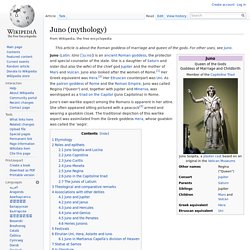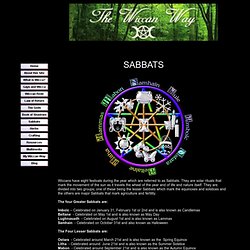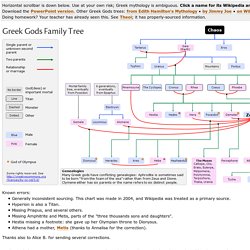

Primeval Gods of Greek Mythology THEOI.COM. List of water deities. Efiks Tribe of Calabar also have water deities known as Ndem This article is about Water Deities.

For the novel by Wilbur Smith, see River God. Poseidon, Greek god of seas and waters. A water deity is a deity in mythology associated with water or various bodies of water. Water deities are common in mythology and were usually more important among civilizations in which the sea or ocean, or a great river was more important. Aztec mythology[edit] Who was first? the romans or the greek? I actually don't think that is a 'dumb' question at all.

The Greeks came first, some 1,000 years before the Romans. Their most appreciated work, the Iliad, was distributed 700 years before the Roman's most popular manuscript, the Aeneid. For us who are continuously inspired with nature's rhythm, enjoy roaming the woods and looking for unmarked paths, spring is the season of wild awakenings.

Although coming from different cultures, most of our ancestors lived in dwellings where the floor was soil and the surroundings were wild, pretty, untamed nature in almost every corner of the world. Some of us have, with great appreciation for our great-grandmothers and grandmothers, preserved and cultivated our relationship with the wilderness and orders of nature.
Some of us are searching for connection through education and rising awareness about nature. On my personal journey, growing up in natural surroundings preserved the essence of my connection with natural world. MythNET - Olympian Gods. The Olympians are a group of 12 gods who ruled after the overthrow of the Titans.

All the Olympians are related in some way. They are named after their dwelling place, Mount Olympus. Juno. Roman Goddess Juno. Areas of Influence: Juno was the Goddess of marriage, pregnancy and childbirth.

She was the Queen of the Gods and part of the Capitoline triad that also included Minerva and Jupiter. This Deity was an embodiment of the traditional female roles of wife and mother. One of her titles was Lucino (meaning light) as she helped to bring children into the light of this world at birth. She was also said to set and strengthen a child's bones. She was also Goddess of conception, a Goddess to be called upon in labour and one who helped settle disagreements between spouses. Juno (mythology) Juno's own warlike aspect among the Romans is apparent in her attire.

She often appeared sitting pictured with a peacock[3] armed and wearing a goatskin cloak. The traditional depiction of this warlike aspect was assimilated from the Greek goddess Hera, whose goatskin was called the 'aegis'. The name Juno was also once thought to be connected to Iove (Jove), originally as Diuno and Diove from *Diovona.[4] At the beginning of the 20th century, a derivation was proposed from iuven- (as in Latin iuvenis, "youth"), through a syncopated form iūn- (as in iūnix, "heifer", and iūnior, "younger").
This etymology became widely accepted after it was endorsed by Georg Wissowa.[5] Juno's theology is one of the most complex and disputed issues in Roman religion. Juno is certainly the divine protectress of the community, who shows both a sovereign and a fertility character, often associated with a military one. A temple to Iuno Sospita was vowed by consul C. Juno. G. However in 1882 R. M. The Wiccan Way - Sabbats. Wiccans have eight festivals during the year which are referred to as Sabbats.

They are solar rituals that mark the movement of the sun as it travels the wheel of the year and of life and nature itself. They are divided into two groups; one of these being the lesser Sabbats which mark the equinoxes and solstices and the others are major Sabbats that mark agriculture and fertility. The four Greater Sabbats are: Imbolc – Celebrated on January 31, February 1st or 2nd and is also known as Candlemas Beltane - Celebrated on May 1st and is also known as May Day Lughnasadh - Celebrated on August 1st and is also known as Lammas Samhain - Celebrated on October 31st and also known as Halloween The Four Lesser Sabbats are: - October 31st-Also known as Halloween, November Eve, Feast of the Dead, Feast of Apples or All Hallows Eve.
Greek Gods Family Tree. Ludios.org.

Norse Mythology. Godchecker.com - Your Guide To The Gods. What witches have to do with women’s health. I recently attended a lunch with a group of women to talk about food and health.

I’d come to the conclusion that my health would be better served doing this than talking to my doctor. He was unable to answer questions about studies that included women participants and how the findings might differ from the research he was citing, all of which only studied men. I now have a new doctor and we get along just fine. Less than 400 years ago, I, and every woman at that lunch with me, might very well have eaten our heart-healthy meal then been merrily immolated as a coven of witches. There we were, taking about herbs and using our senses to achieve healthy outcomes. As Barbara Ehrenreich and Deirdre English explain in the 2010 revision to their classic book “Witches, Midwives & Nurses,” between the 14th and the 17th centuries, tens of thousands of people were killed as witches. What were these women burned (also strangled, hanged and beheaded) to death for?